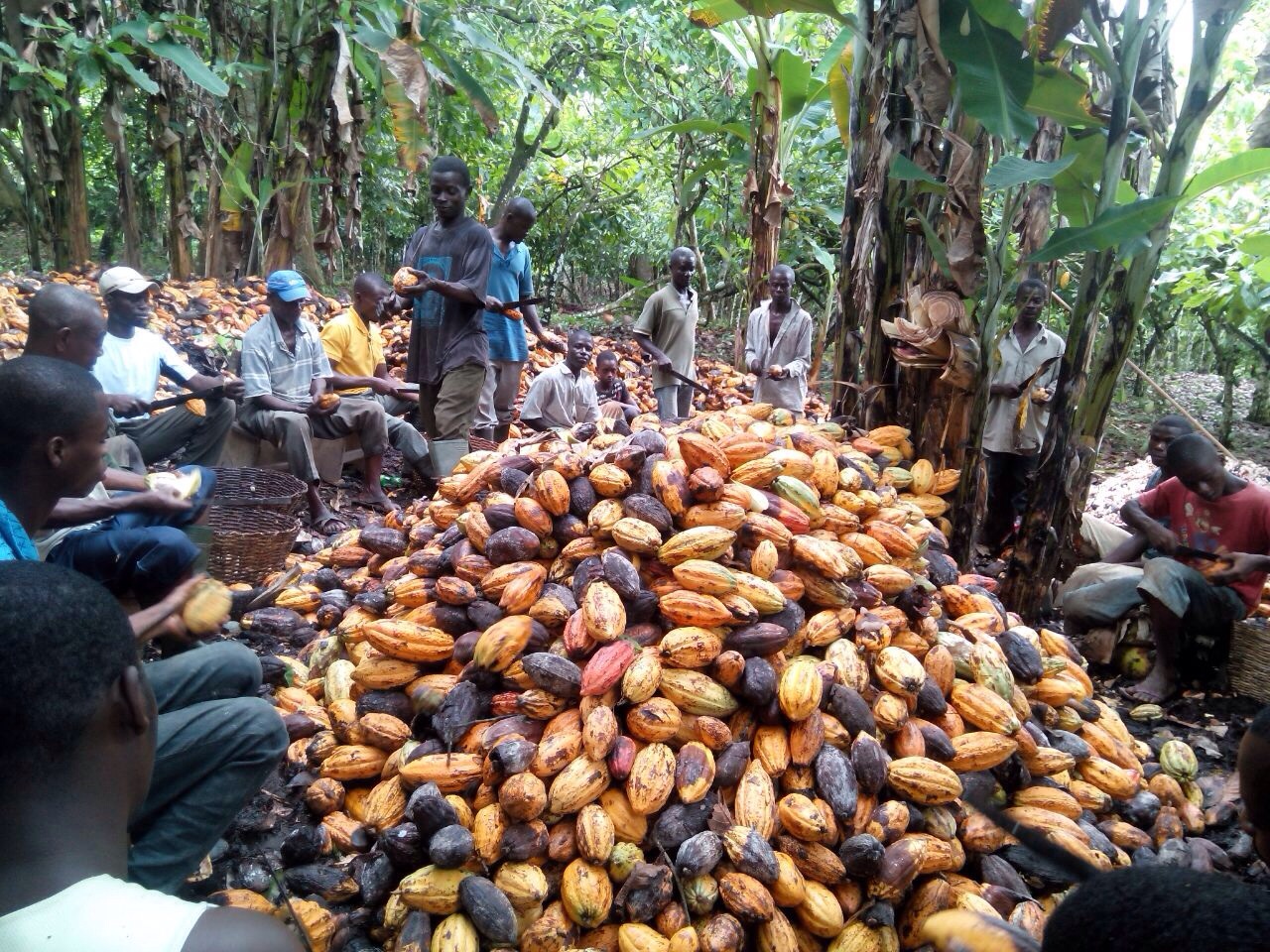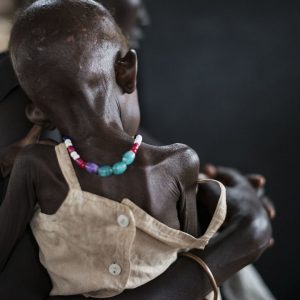Modern Slavery
Individuals at the bottom in a supply chain are often separated from the product of their labor, and insufficiently acknowledged as individuals. Chocolate supply chains in particular can be obscured to the point of near invisibility when trying to understand where beans have been farmed, who has farmed them, and at what cost. The abstract notion of supply chain labor and an alarming prevalence of child labor are grounded in the stories of the formerly enslaved and those changing the system.
The University of Chicago’s NORC Report suggests in the last decade a 62 percent increase in cocoa production led to a 13 percent increase in children aged 5-17 engaged in hazardous labor on Côte d’Ivoire and Ghana cocoa supply chains. Companies who refuse to raise the price at which they will buy cocoa leave the responsibility to plantation owners, who have to cut corners to meet demand for their product; this leads to hazardous and detrimental outcomes for children on the farms.
Cedric trains now to be a mechanic. He works hard, hoping to send his sister to school. His parents sent him to an Ivory Coast plantation to earn money for his own schooling as a child – for many children in West Africa, working to pay for school is assumed the norm. That labor can be common tasks, similar to chores; or can exploit the individual and cost them their childhood, education, and health. The cost of Cedric’s labor is visible on his shins: he learned the hard way at ten years old to swing his machete away from the body when cutting down beans. The greed of the supply chain kept Cedric from rising up in life. He never got the money for his education, though with his job now he can at least keep the same from happening to his sister.
Being beat with sticks – and sometimes motorbike cables – kept Laeticia hard at work, more than the empty promise to receive money for school. Refusing to work could mean disappearance overnight; a few recall gunshots echoing across the plantations. Laeticia reclaimed her life from the plantations after two years without seeing money. She never entered the schoolhouse during her time on the farm.
The outcomes of child labor are not always so grim, but in the cocoa industry they are most often exploitative. Farmers, who must rely on the child labor shortcut to earn a bare minimum of income, must move outward from their homes into the communities where children are forced to skip school to help harvest beans. In effect, communities are forced to use the current system to negatively mortgage their own future well-being.
For decades, Nestlé, Mars, Hershey, and other chocolate industry giants have admitted to problems in their supply chain which sustain the worst forms of illegal child labor. The top of the chain is quick to condemn modern slavery in their industry. But, the system which employs modern slavery is so central to the perceived success of large chocolate companies and many others in the supply chain that a blind eye has long been turned to finding a solution, cited as a competitive disadvantage to try fixing the problem. Only recent public pressure has forced these companies to take tangible steps towards improvement.
These efforts – primarily by smaller chocolate companies, key lawmakers, and the empowered formerly enslaved – are leading to more accountability and transparency policies such as incentive to be certified by an independent body or mandatory minimum prices for cocoa.
Ending modern slavery in the cocoa supply chain is not impossible to solve, nor is it the competitive disadvantage some make it out to be. To be sure, slavery was officially abolished in the nineteenth century. Its legacy continues into supply chains today however. Modern slavery, defined as forced labor and exploitation of adults and children, remains present. There is a recognized need to develop transparency, accountability, responsibility, in many industries to reduce systemic modern enslavement and extreme poverty.
There are some companies surfacing as proponents of change, proving the possibility of chocolate without slavery is easy and attainable, sourcing cocoa sustainably and treating West African partners with equal respect – as equal links of the supply chain. Nineteen of those companies in the chain signed amicus curiae briefs for a current supreme court case against Nestlé USA and Cargill by six formerly-enslaved Malians, arguing for accountability from US Corporations that benefit from modern slavery to cut labor expenses.
Modern slavery or exploitation is also present in other industry supply chains, where those at the end work for far less than a living wage – which would still be less than deserved. In the United States, for example, the number of working poor has increased to 12 million people, from 7 million in 1980. Due diligence for laborers has been de-prioritized by corporations with influence in policy. Only outside pressure has made slow progress in pushing industry giants to initiate change.
With such a fragmented supply chain as in cocoa production – in which the two ends are practically completely segregated from each other – it is critical to involve the key players in a change-making process, and hold them accountable for making that progress.
As governments move closer to legislation on supply chain due diligence, chocolate giants have claimed to get on board with the legislation (though whether this transitions to action is an important concern). A position paper on the European Union’s approach towards cocoa suggests that policy and regulation should be sector-specific, to incorporate the perspectives of relevant actors and better focus any policy solutions. This position paper and the Harkin-Engel Protocol from 2001 were developed with major industry players such as Nestlé, Mars, and Barry Callebaut. These corporations pledged to remove the worst forms of child labor entirely from their chain by 2005.
Companies make the impact
Without oversight and penalty for failing to meet fair labor practices, the protocol did not prove a success; cocoa farmers continue to earn too little income to survive without resorting to dangerous labor practices. They lack the necessary support to cease relying on children for work which is not only hazardous, but also denies these children education, access to health care, and other essential needs.
Major players in the chocolate industry have failed to actualize on pledges to reduce modern slavery in their supply chains and consistently ignore tragic cases of child labor in its worst form, which they benefit greatly from; profits reaped by the chocolate industry can remain at the top of the supply chain, and as demand increases the price paid to farmers remains stagnant.
The farmer cannot ask their trees to provide so much more. Nor does the farmer have much voice in the ethics of the supply chain. So many are incentivized to seek alternative, dangerous, illegal labor practices. Children are enslaved by the system without thought for their youth or future.
By 2010, next to no progress came out of the Harkin-Engel Protocol; the plan was then delayed to reduce the worst forms of child slavery by 70 percent by 2020. Now in 2021, 20 years since the first protocol was signed and lauded for addressing the problem, enslaved children have become adults and been replaced with ever more children. With a voluntary statement, nothing was gained but a pledge by companies seeking to save public face. Signatories to the original and updated protocol continue to shirk responsibility for their direct role in enslavement, which has allowed the number of children working on West African cocoa farms to exceed 1.5 million in the past ten years.
The protocol made it possible for signatories to claim compassion, and pledge to make the necessary changes without accountability for their follow-through. Moderating the transition away from child labor is largely left unrealized; a bill introduced in the US House of Representatives in 2011 and again in every successive Congress has not progressed past introduction. The Ghanaian and Ivoirian governments’ attempts to employ a surcharge or other accountability measures have faced strong opposition in implementation by major chocolate suppliers.
For too long the industry has been left to voluntary diligence, pledging to make the needed changes while claiming not to be responsible for modern slavery on the farms as they are often unaware of the particulars in their own supply chain. The cocoa moves to farmer cooperatives who sell to larger cooperatives, who then sell to processors or merchants, who finally sell to chocolate manufacturers before being supplied to consumers on store shelves – often all without traceability of the exploitation behind it. Luckily modern slavery is increasingly unaccepted by impact companies, which are ready to revolutionize the old way of doing business.
Dutch impact company Tony’s Chocolonely was born out of a group of journalists’ investigation into cocoa supply chains. It received false narratives and circular explanations from stubborn actors, chocolate producers, certification companies and cooperative leaders, for the high rates of modern slavery and child labor. In its interviews with cooperative leaders in West Africa, who amass cocoa from farms before selling to processors; and with major chocolate companies, responsibility was not taken for the alarming accounts of child labor and modern slavery the journalists had uncovered when in West Africa.
Co-ops certified as fair trade were intended to ensure fair wages and certain bonuses for farmers from suppliers, and to facilitate human rights standards; yet the farmers never got their bonuses and the cooperatives didn’t think shortfalls were their fault. Companies certified as fair-trade could not trace the sources of their beans, making it impossible to ensure fairness or equality in their supply chain.
This is not to say that certifications are meaningless. Fair-trade certification is now a strong improvement on ensuring due diligence in supply chains. Certification can thus in ideal cases bridge the gap in alienation of labor, putting consumers in direct relation with laborers by informing the former of the latter’s proper treatment. Some certifications in place today ensure living wages or better.
On the company side, certification as a B Corporation can recognize companies for their social and environmental performance. There are valid concerns that certifications become more of a marketing strategy, merely to convince us that what we buy has been certified for doing something right. The logo on the label is in fact meant to certify due diligence, which must include transparency – it is necessary to uphold standards in the certification system so this can be more than semantics like voluntary protocols.
Among others, Tony’s makes due diligence transparent for its consumers. The “open chain” initiative displayed on its bars engages stakeholders as part of a collaborative effort, saying “together we’ll make chocolate 100 percent slave free.” Consumers, farmers, retailers, and governments – and the major chocolate companies – all have a role in the chain and are thus meant to be engaged not just as commodities in the production process.
A business’s social responsibility is not just to increase profits, despite the influence Milton Friedman’s argument left on our society; that is, a corporation is responsible for more than making money and providing a product, it is accountable for every member in its supply chain. A corporation is to ensure the “key players” in its chain are empowered in the system and are an equal part of the chain. This type of business model can reduce the exploitation of labor and bring links of the chain into relations with each other up and down the supply line.
Tony’s partners with other suppliers to promote five sourcing principles which evidentially reduce modern slavery. These five sourcing principles include: traceable beans, to ensure a transparent and accountable supply chain; paying a higher price, enabling farmers to make a living income; strong framers, working with and helping to develop cooperatives which empowers farmers for structural change; engaging in five-year commitments with cooperatives for income security and to give farmers more investment opportunity; and undertaking productivity, diversification and quality programs to help farmers raise up their community.
Using these principles has proved most effective over legislative, legal, and other strategies for reducing slavery. Tony’s founders initially tried to speak with industry giants to change their ways, and then sought legal action to bring attention to the worst forms of child labor being used, both to no avail. The last solution was to start their own brand and share their story: that it is possible, and far from difficult, to make the supply chain equal. Within its first 15 years, Tony’s has become the largest chocolate brand in the Netherlands and is increasingly popular in US and international markets. Due diligence then is clearly not a disadvantage to the chocolate industry.
University of Chicago’s NORC Report points to strong success in initiating community ownership and direct partnerships, and the most success when coupled with school-based intervention, community mobilization, and communication between actors in the region. Tony’s has helped to build schools in the villages of its partner cooperatives, used its non-profit “Chocolonely Foundation” to further invest in community development, and increasingly partners with other chocolate companies to bring more on board with the sourcing principles. It has consistently effectively reduced rates of child labor and modern slavery.
Tony’s strategy is also dynamic, in that the system is not yet perfect. Moments still arise when Tony’s must confront its partners to challenge the labor practices and ensure due diligence. But that’s what due diligence is all about. The transparency in communication, even when sharing a challenge is a big part of what makes the strategy work. This is a significant distinction between making stakeholders instead of shareholders. Every person along the ‘open’ supply chain is accounted for, and accountable for those ahead and behind in the chain.
What We Do Now
At our end of the chain, we can thank Tony’s and other ethically-oriented companies for making clear who is behind the bars of chocolate we pickup online and in stores. Awareness coming from these chocolate companies helps with other methods of change previously unsuccessful: the current US Supreme Court case is fifteen years in the making, and another case by formerly enslaved will be heard by the court in the coming months. And the public has begun to make their voice heard on this issue.
Legal labor practices are on a slow rise in West African cocoa farming, and so too in enforcement of trade practices. This shows the problems in the industry can be solved. But, the impact will be limited until a human rights-oriented, due diligence system is implemented and upheld by all key players in the industry.
In other industries, leaving responsibility to the end-of-chain workers has proved embittered in struggle. Uber used its financial and political power to overturn new rights for their drivers in California and to prevent the due diligence called for by state legislature and workers making less than living wages. The drivers will surely not give in, but their steps forward have been taken back.
For Amazon workers, 25 years of exploitation is coming to a head with unionization efforts starting in Alabama. The company is diligently working to influence workers against organizing, alleging counts of improved conditions over other labor options in the area, such as higher wages – though this is hardly the case. Further these are not enough, laborers remain excluded from the benefits of their product, poverty is sustained; solidarity is rising across the nation for our low-wage workers to be given the dignity they deserve in their work and an equal spot in the supply chain.
When we make a choice of where to buy, and what, we are affecting more than our own satisfaction, from a brand name chocolate bar or easily accessible shipping option. We are empowering those companies we buy from to set standards in their industry. Major chocolate companies citing a “competitive disadvantage” in changing supply chain ethics can be made aware of a far graver disadvantage to maintaining their status quo, and can be charged with a disadvantage should consumers begin to hold their brands accountable and shop ethically.
Standing at the core of the issue according to Belinda Borck, Tony’s impact editor, is the unequal supply chain. Major corporations hold most of the weight in the cocoa industry, after the consumer; the consumer determines demand for chocolate, and can have great influence on demand for a better supply chain which supports farmers and producers alike, which puts us in relation to those providing our chocolate. It would be hard to find logic which supports an unequal chain once all of the links are known and their equality in dignity is recognized. It’s up to consumers to use the power on their end of the chain, to uplift the links we rely on – as they too rely on us for their right to quality of life.
Featured Image Source: Wikimedia Commons / ICCFO, CC BY-SA 4.0
Note: the author currently works as a free agent with Tony’s Chocolonely. However, Tony’s Chocolonely and Berkeley Political Review hold no direct relationship. Inquire for event sponsorship and engagement with Tony’s by contacting the author at glayton@berkeley.edu






Comments are closed.